Your kitchen countertop is more than just a surface; it’s the foundation of your kitchen’s design and functionality. It plays a vital role in the aesthetic appeal of your kitchen while enduring daily wear and tear. Choosing the right countertop material is a decision that impacts your kitchen’s durability, maintenance needs, and overall style.
With so many countertop options available, the decision can feel overwhelming. From natural stones to engineered surfaces, each material comes with unique features, advantages, and challenges. This guide will walk you through the essential facts about popular countertop materials, including their pros, cons, and maintenance tips, so you can make an informed choice.
We invite you to visit our showroom to explore these materials in person. Seeing and touching samples can make all the difference in finding the perfect countertop for your kitchen. Our design experts are on hand to guide you through the selection process and help you visualize how each option will look in your space.
Laminate Countertops
Overview
Laminate countertops are made of layers of paper or fabric impregnated with resin, fused to particleboard or MDF (medium-density fiberboard). They are one of the most affordable countertop options available.
Pros
- Cost-Effective: Laminate is one of the most budget-friendly materials.
- Variety: Available in a wide range of colors, patterns, and designs, including those that mimic wood or stone.
- Lightweight: Easy to install and ideal for DIY projects.
- Low Maintenance: Requires minimal upkeep compared to natural stone options.
Cons
- Durability: Prone to scratches, burns, and delamination over time.
- Seams: Visible seams can detract from a seamless appearance.
- Repair Limitations: Damage is often irreparable, requiring replacement.
Maintenance Tips
- Avoid placing hot pots or pans directly on the surface to prevent burns.
- Use cutting boards to prevent scratches.
- Clean with a mild detergent and a soft cloth.
- Inspect for edge wear regularly and consider professional refinishing for long-term use.
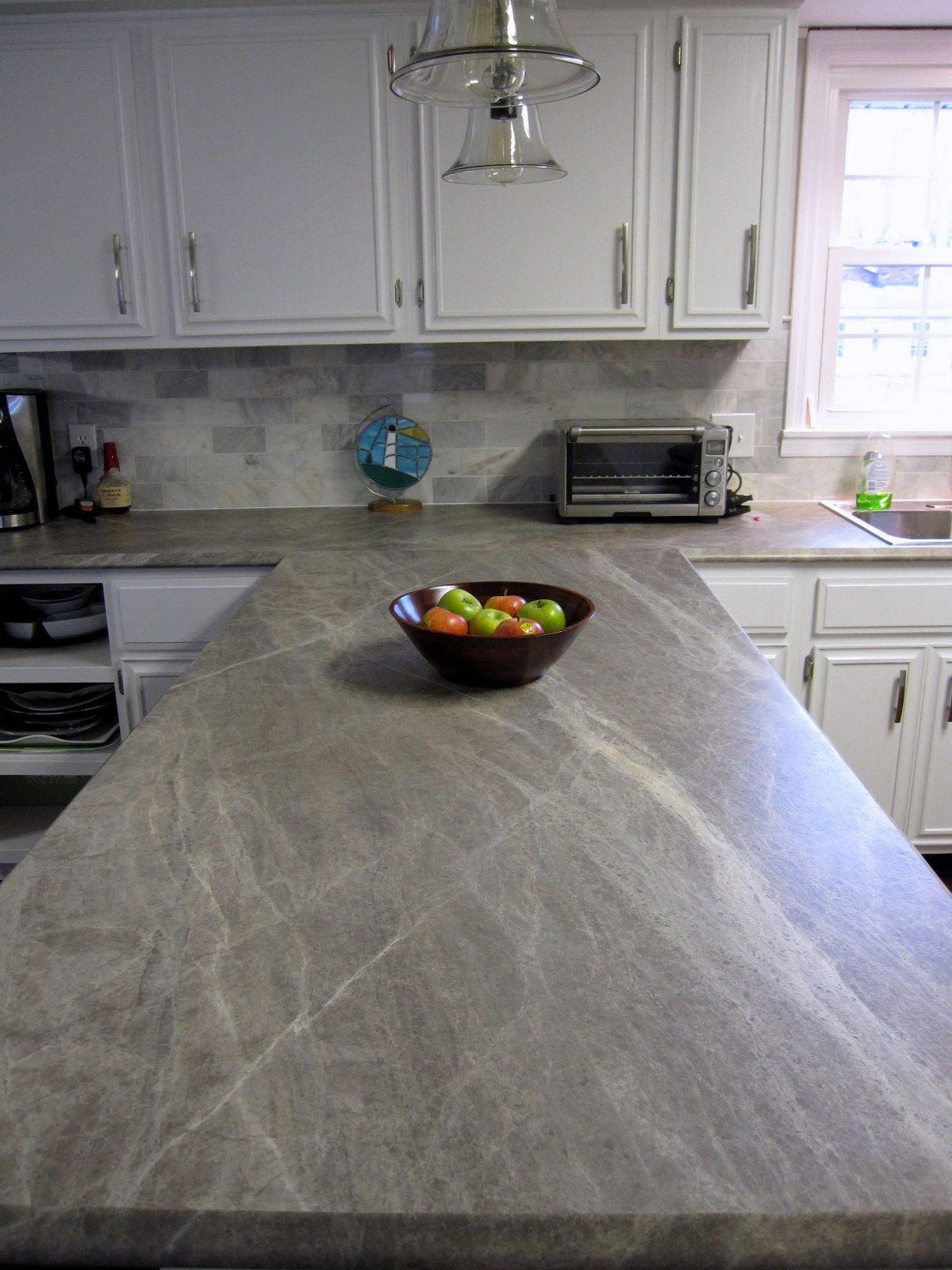
Cultured Marble Countertops
Overview
Cultured marble is a blend of marble dust and resin, creating a non-porous surface. It’s often used as an affordable alternative to natural marble and offers a consistent pattern throughout the slab. Typically used in bathrooms for vanity tops and showers.
Pros
- Affordable: Less expensive than natural marble while mimicking its appearance.
- Non-Porous: Resists stains and bacteria, making it hygienic.
- Customizable: Available in various colors and patterns to suit your design preferences.
- Lightweight: Easier to handle and install compared to natural marble.
Cons
- Prone to Scratches & Stains: Softer surface that can scratch easily if mishandled.
- Heat Sensitivity: Can be damaged by extreme heat or prolonged exposure to sunlight.
- Artificial Look: Doesn’t have the natural veining and depth of real marble, which some homeowners prefer.
Maintenance Tips
- Avoid abrasive cleaners to prevent surface damage.
- Clean spills quickly to prevent discoloration and dullness.
- Use trivets or heat pads to protect against heat damage and discoloration from hot pans.
Solid Surface Countertops
Overview
Solid surface countertops, like Corian, are made from acrylic or polyester resins combined with minerals. These countertops offer a seamless, contemporary look and are highly versatile in terms of design.
Pros
- Seamless Appearance: Joints are nearly invisible, providing a sleek and modern aesthetic.
- Customizable: Available in various colors, textures, and patterns to complement any kitchen style.
- Repairable: Scratches, chips, and minor damage can often be buffed out or repaired easily.
- Non-Porous: Resists stains and bacteria, making it a hygienic choice.
Cons
- Vulnerable to Heat: Can warp or discolor if exposed to high temperatures.
- Prone to Scratches: Softer surface compared to stone options; may require regular maintenance.
- Cost: While not as expensive as quartz or marble, it’s pricier than laminate.
Maintenance Tips
- Avoid placing hot items directly on the surface; always use heat-resistant mats.
- Use non-abrasive cleaning products to prevent scratches and maintain a polished appearance.
- Regularly buff out minor scratches with a gentle polishing compound or sanding pads.
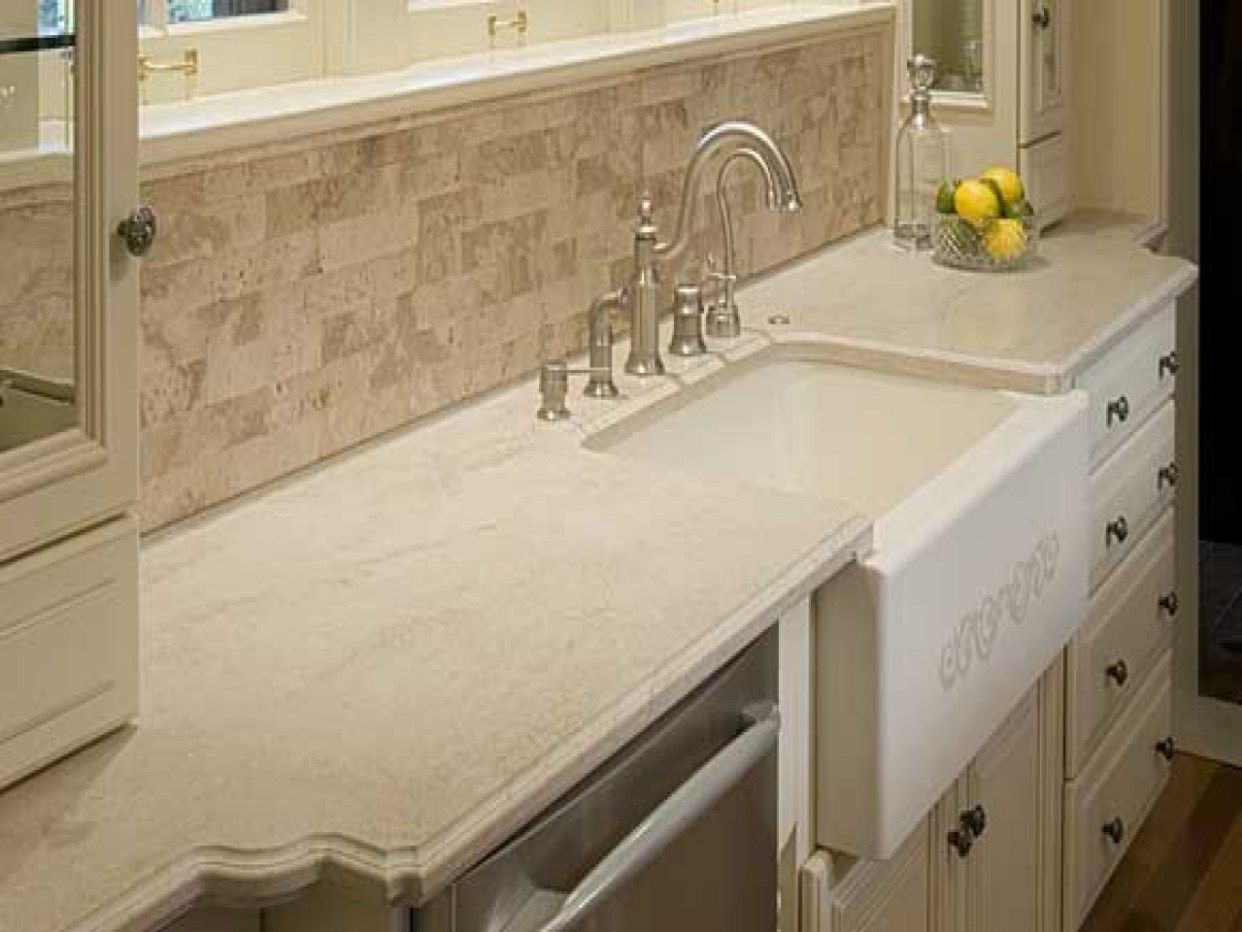
Wood Countertops
Overview
Wood countertops, including butcher block, offer a warm, natural look that adds charm and character to any kitchen. They can be crafted from a variety of woods, such as maple, walnut, and oak.
Pros
- Aesthetic Appeal: Brings warmth, natural beauty, and a touch of rustic elegance to your kitchen.
- Versatile: Can be sanded and refinished to look new, extending the lifespan of the countertop.
- Eco-Friendly: Can be sourced sustainably, making it an environmentally conscious choice.
- Natural Antibacterial Properties: Certain woods, like maple, naturally resist bacteria.
Cons
- High Maintenance: Requires regular sealing and oiling to prevent drying and cracking.
- Vulnerable to Moisture: Can warp, swell, or crack if exposed to excessive water.
- Prone to Scratches and Stains: Surface needs protection during food preparation to maintain its appearance.
Maintenance Tips
- Regularly oil the surface to keep it sealed and hydrated.
- Clean spills immediately to prevent stains and water damage.
- Use cutting boards to protect against scratches and gouges.
- Sand and reseal the surface as needed to restore its appearance.
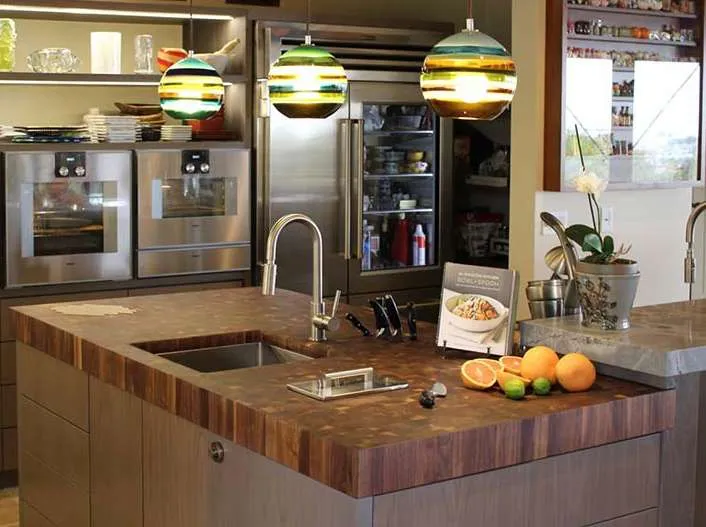
Soapstone Countertops
Overview
Soapstone is a natural stone known for its smooth texture, rich, dark color, and natural veining. Its unique look makes it a favorite for rustic, farmhouse, or industrial-style kitchens.
Pros
- Durable: Resistant to heat, stains, and bacteria, making it an excellent choice for food preparation.
- Low Maintenance: It doesn’t require sealing and is naturally non-porous.
- Aging Gracefully: Develops a natural patina over time, adding to its character.
- Heat Resistance: Can withstand direct contact with hot pots and pans.
Cons
- High Maintenance: Requires regular sealing and oiling to prevent drying and cracking.
- Vulnerable to Moisture: Can warp, swell, or crack if exposed to excessive water.
- Prone to Scratches and Stains: Surface needs protection during food preparation to maintain its appearance.
Maintenance Tips
- Regularly oil the surface to keep it sealed and hydrated.
- Clean spills immediately to prevent stains and water damage.
- Use cutting boards to protect against scratches and gouges.
- Sand and reseal the surface as needed to restore its appearance.
Granite Countertops
Overview
Granite countertops are one of the most popular choices for kitchen design due to their timeless beauty, strength, and durability. As a natural stone, granite is quarried directly from the earth and cut into slabs, ensuring each countertop is unique. Its wide variety of colors and patterns, combined with its heat resistance and scratch resistance, make it a favorite among homeowners.
Granite exudes luxury and sophistication while offering practical benefits for a busy kitchen. It works well in both traditional and modern designs, making it a versatile option for any home.
Pros
- Durability: Granite is highly resistant to heat, scratches, and general wear and tear, making it ideal for high-traffic kitchens.
- Unique Appearance: Every slab of granite has its own natural veining and color variations, creating a one-of-a-kind look.
- Heat Resistance: Granite can withstand high temperatures, so placing hot pots or pans directly on the surface won’t cause damage.
- Adds Value: Granite is considered a premium material that can increase your home’s resale value.
- Wide Variety of Options: Available in numerous colors and patterns, granite works well with different design styles, from sleek and modern to warm and rustic.
Cons
- Porous Surface: Granite is naturally porous, so it needs to be sealed regularly to prevent stains and bacteria from penetrating the surface.
- Cost: Granite is more expensive than some other countertop options like laminate or solid surface, especially for rare or exotic stones.
- Heavy Weight: Granite countertops require sturdy cabinetry and professional installation due to their weight.
- Seam Visibility: In larger kitchens, seams between slabs may be noticeable.
Maintenance Tips
- Seal Regularly: Granite should be sealed at least once a year to maintain its resistance to stains and moisture. Your installer may recommend a specific sealing schedule based on the type of granite.
- Daily Cleaning: Use a soft cloth or sponge with warm water and a mild dish soap to clean the surface. Avoid abrasive sponges or harsh chemicals that could wear down the sealant.
- Avoid Acidic Substances: Spills like lemon juice, vinegar, or wine should be wiped up immediately to prevent etching or discoloration.
- Use Cutting Boards and Trivets: Although granite is highly durable, cutting directly on the surface can dull your knives, and while it resists heat, trivets or hot pads are recommended for prolonged exposure to high temperatures.
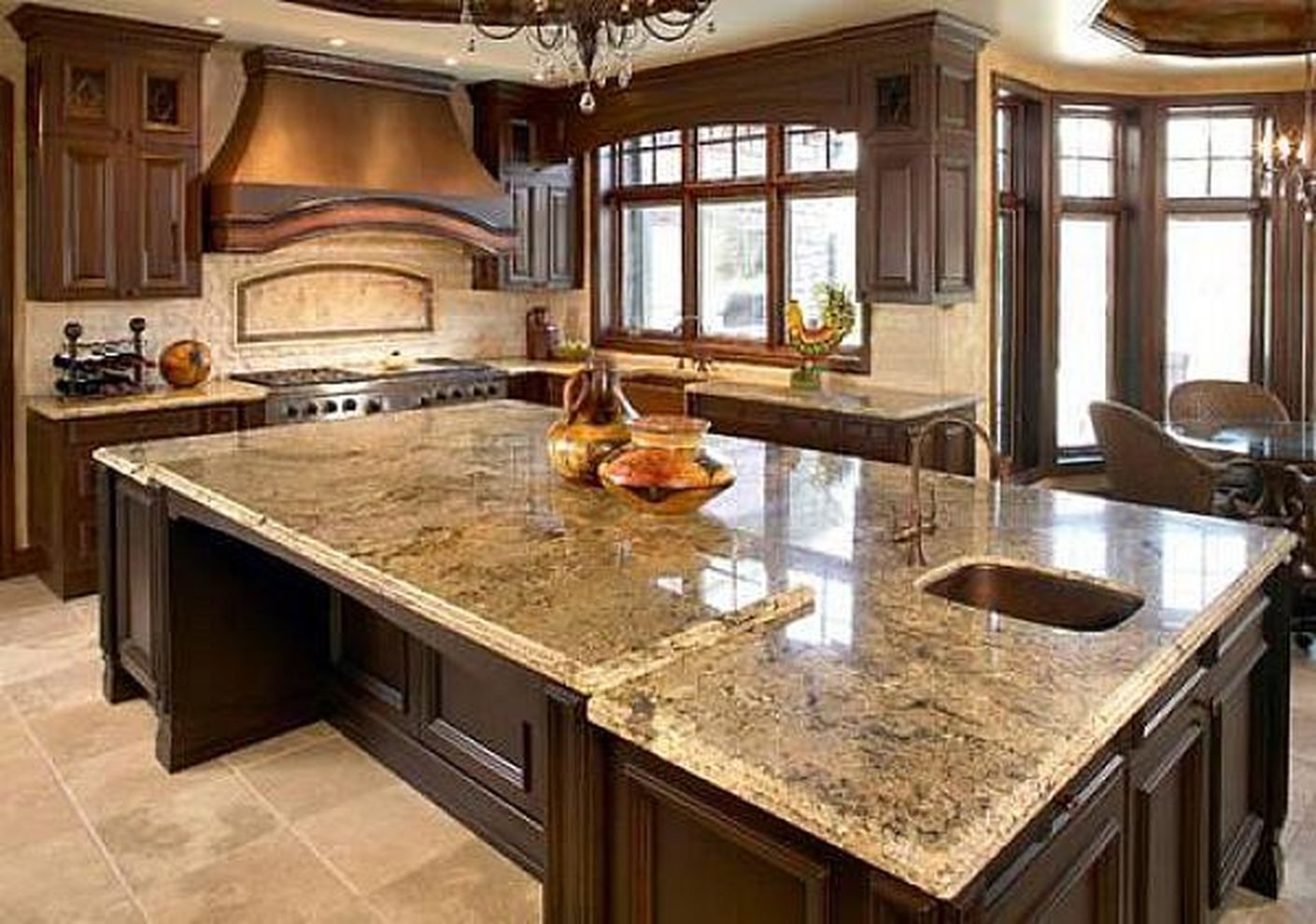
Marble Countertops
Overview
Marble is a timeless, elegant material that’s often associated with luxury kitchens. Known for its unique veining and patterns, marble adds sophistication and brightness to any space.
Pros
- Elegant Appearance: Adds a high-end, luxurious look to your kitchen.
- Heat Resistant: Handles high temperatures well, ideal for baking and cooking enthusiasts.
- Unique Patterns: No two slabs are alike, ensuring a one-of-a-kind design.
- Natural Coolness: Maintains a naturally cool temperature, great for pastry preparation.
Cons
- Porous Surface: Prone to staining and etching from acidic substances like vinegar and citrus.
- High Maintenance: Requires regular sealing to maintain its resistance to stains and moisture.
- Cost: One of the more expensive countertop options.
- Softness: More prone to chipping and scratching compared to harder stones like granite.
Maintenance Tips
- Seal the countertop regularly to prevent stains and moisture absorption.
- Wipe up spills immediately, especially acidic substances like lemon juice or wine, to avoid etching.
- Use cutting boards and trivets to protect the surface.
- Clean with pH-neutral cleaners to avoid damaging the sealant.
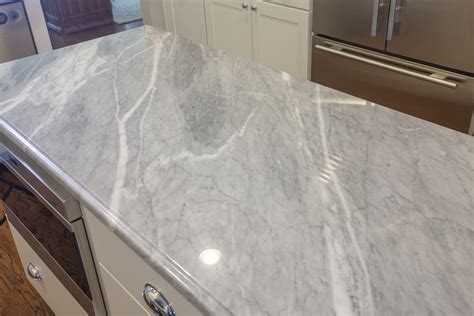
Granite Countertops
Overview
Granite countertops are one of the most popular choices for kitchen design due to their timeless beauty, strength, and durability. As a natural stone, granite is quarried directly from the earth and cut into slabs, ensuring each countertop is unique. Its wide variety of colors and patterns, combined with its heat resistance and scratch resistance, make it a favorite among homeowners.
Granite exudes luxury and sophistication while offering practical benefits for a busy kitchen. It works well in both traditional and modern designs, making it a versatile option for any home.
Pros
- Durability: Granite is highly resistant to heat, scratches, and general wear and tear, making it ideal for high-traffic kitchens.
- Unique Appearance: Every slab of granite has its own natural veining and color variations, creating a one-of-a-kind look.
- Heat Resistance: Granite can withstand high temperatures, so placing hot pots or pans directly on the surface won’t cause damage.
- Adds Value: Granite is considered a premium material that can increase your home’s resale value.
- Wide Variety of Options: Available in numerous colors and patterns, granite works well with different design styles, from sleek and modern to warm and rustic.
Cons
- Porous Surface: Granite is naturally porous, so it needs to be sealed regularly to prevent stains and bacteria from penetrating the surface.
- Cost: Granite is more expensive than some other countertop options like laminate or solid surface, especially for rare or exotic stones.
- Heavy Weight: Granite countertops require sturdy cabinetry and professional installation due to their weight.
- Seam Visibility: In larger kitchens, seams between slabs may be noticeable.
Maintenance Tips
- Seal Regularly: Granite should be sealed at least once a year to maintain its resistance to stains and moisture. Your installer may recommend a specific sealing schedule based on the type of granite.
- Daily Cleaning: Use a soft cloth or sponge with warm water and a mild dish soap to clean the surface. Avoid abrasive sponges or harsh chemicals that could wear down the sealant.
- Avoid Acidic Substances: Spills like lemon juice, vinegar, or wine should be wiped up immediately to prevent etching or discoloration.
- Use Cutting Boards and Trivets: Although granite is highly durable, cutting directly on the surface can dull your knives, and while it resists heat, trivets or hot pads are recommended for prolonged exposure to high temperatures.

Quartz Countertops (Man-Made)
Overview
Man-made quartz countertops are engineered surfaces composed of 90-95% crushed natural quartz combined with resin and polymers. This process results in a non-porous, durable material that mimics the appearance of natural stone while offering superior strength and resilience. Quartz countertops are available in a wide variety of colors, patterns, and finishes, making them a popular choice for homeowners seeking both style and functionality.
Pros
- Durability: Quartz is one of the hardest materials available for countertops. It is resistant to scratches, chips, and cracks, making it ideal for high-traffic areas.
- Low Maintenance: Unlike natural stone surfaces like granite and marble, quartz is non-porous, meaning it does not require sealing. It’s also resistant to stains and bacteria, making it a hygienic choice for kitchens and bathrooms.
- Variety of Colors & Patterns: With its wide range of colors and patterns, including those that resemble natural stones like marble and granite, quartz can match any kitchen or bathroom style. This versatility is one of the key selling points for homeowners.
- Consistency: Since quartz is engineered, it provides a more uniform pattern and color throughout the surface compared to natural stones, which can have natural variations that may or may not be desirable.
Cons
- Heat Sensitivity: Although quartz is heat resistant to a degree, it is not as heat-resistant as natural stones like granite or soapstone. Hot pots and pans should always be placed on trivets or hot pads to avoid damage.
- Cost: Quartz countertops are generally more expensive than laminate or solid surface countertops, although they are often less expensive than high-end natural stones like marble.
- Limited Repair Options: While quartz is highly durable, it is not indestructible. If it does crack or chip, repairs can be difficult and may require professional help.
Maintenance Tips
- Daily Cleaning: Simply wipe down with warm water and a mild dish soap solution or a pH-balanced cleaner.
- Avoid Harsh Chemicals: While quartz is durable, acidic cleaners like bleach or ammonia can cause damage over time, so avoid using them.
- Protect Against Heat: Always use trivets, hot pads, or a heat-resistant mat under hot cookware to prevent heat damage.
- Avoid Sharp Objects: Though quartz is scratch-resistant, it’s still a good idea to use cutting boards to preserve the surface.
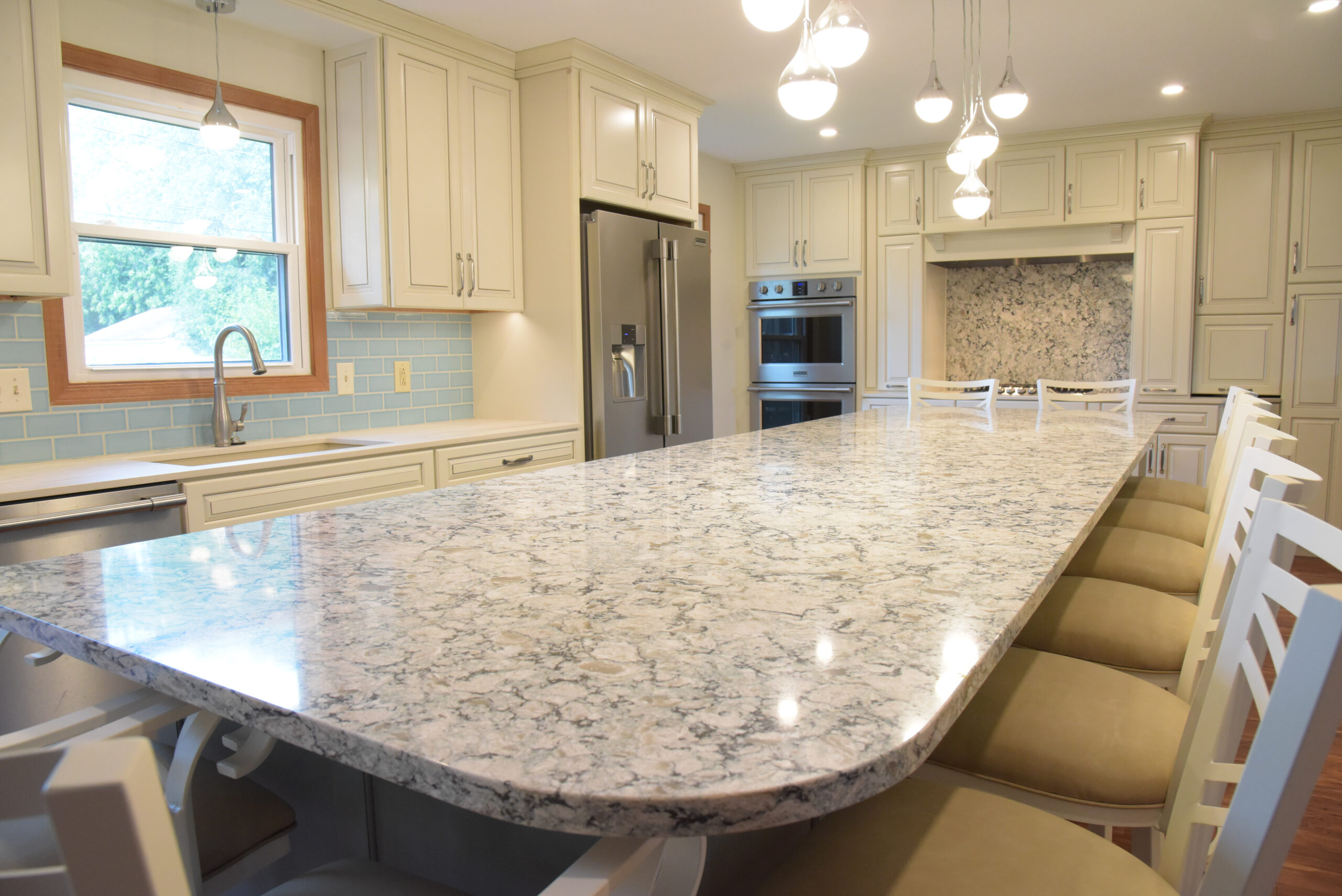

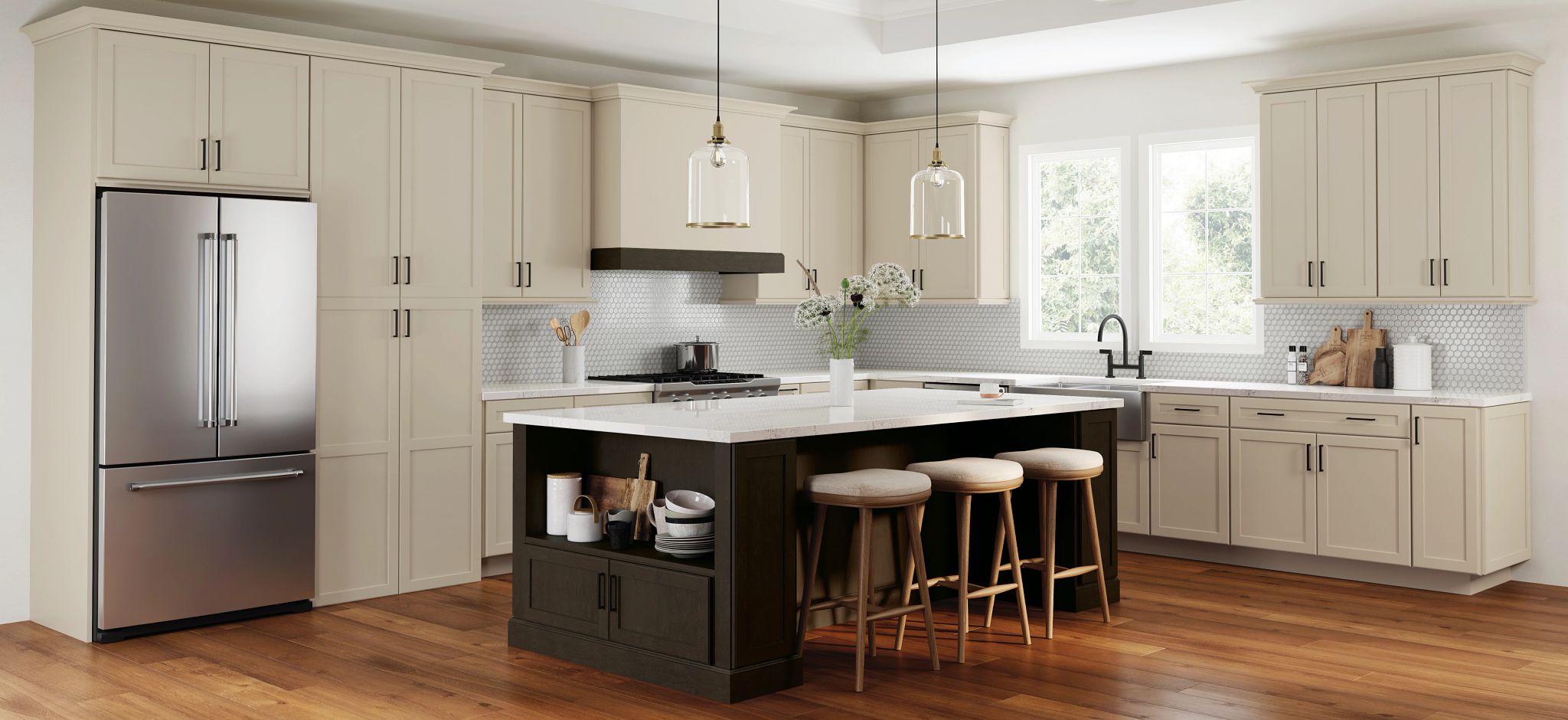

Recent Comments